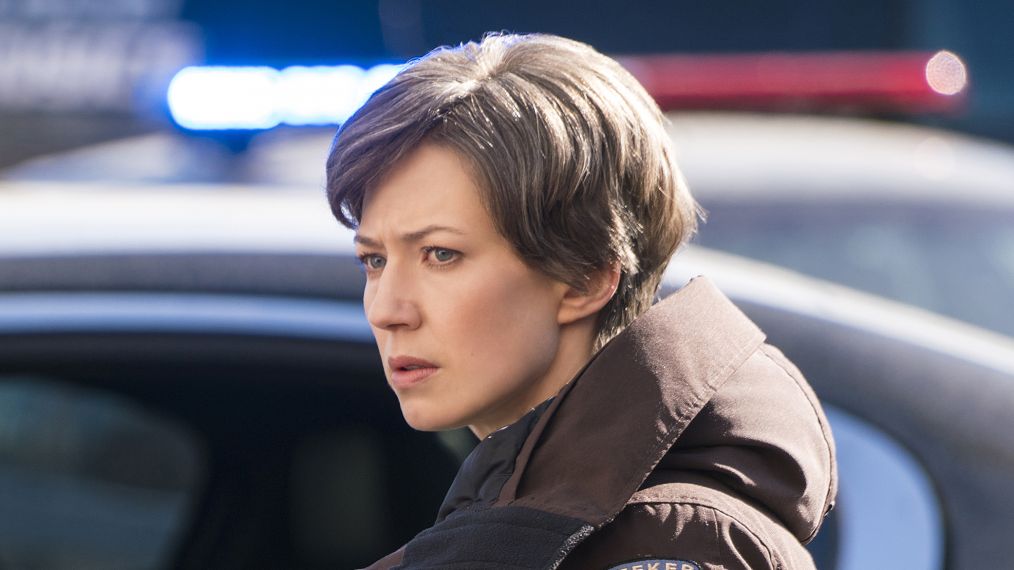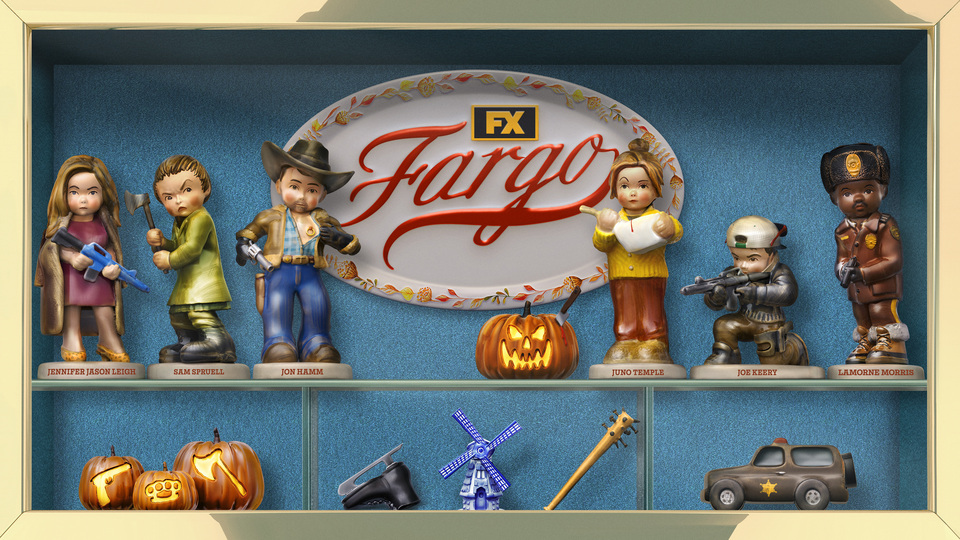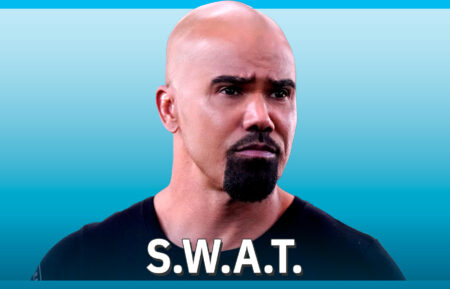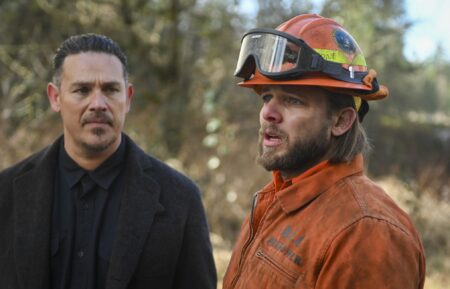‘Fargo’ Season 3 Finale: ‘Somebody to Love’ (RECAP)

Spoiler Alert
[Spoiler Alert: This recap contains spoilers about “Somebody to Love,” the Season 3 finale of Fargo.]
As always seemed destined, the final moments of Fargo come down to Gloria and Varga, face-to-face as representatives of unpredictable pasts in a contest of conflicting, demonstrable truths. Gloria, who has spent the season gradually coming to terms with the fact that the world isn’t always what it seems, predicts a future of Rikers Island for Varga and fried Snickers bars for herself and her son. Varga, who has spent his life working to prove that truth stems from wealth, power and violence, predicts his own rescue by a shadowy bureaucracy beyond reproach.
Each of these futures seems almost equally plausible— though Varga’s version may have a slight edge of believability given the events of the preceding 10 hours of television— and as the camera pans to the clock on the wall and the credits roll, each outcome remains plausible. It’s an ending like the spinning top in Inception, leaving more questions than answers about the nature of objective reality, but giving viewers plenty with which to speculate.
“We see what we believe, not the other way around,” says Varga.
Arriving at the faceoff between these two ideological leads of the season necessitated the removal of just about every other character from the dichotomy. This season turned out to be a bloody one, with Gloria and Varga basically the only major characters to make it to the end (guest stars like Sy, Winnie and Mr. Wrench not withstanding).
The episode opens with a shot of Emmit signing away his company, and by extension, his usefulness to Varga, which is a dangerous indicator of things to come. Meanwhile, Gloria signs her resignation from the Meeker County police, only to revoke the document when she gets a call from everyone’s favorite IRS pencil pusher, Larue Dollard.
Emmit, tired and broken, makes a grab for Meemo’s gun after he signs over the paperwork, trying to prove that he’s “not food,” but against Varga, Meemo and a trained fire team, he’s hopelessly outmatched from the start. Whether or not Varga’s claim about a fingerprint scanner on the gun’s grip is true, Emmit takes some of Varga’s signature mouth spray to the eyes and a fire poker to the back of the head before he can pull the trigger.
The villains leave him wounded, but alive, on the floor of his own dining room. He’s survived his final dealings with Varga, but he’s yet to face his ultimate judgement. The task of doling that out falls on Nikki, who is on the hunt for vengeance and still operating under the questionable wisdom of Paul Marrane.
With her deck of firearms she’s named after bridge plays and her devoted partner Mr. Wrench, Nikki sets a meeting with Varga in an abandoned storage facility. As the widow Goldfarb has pointed out in episodes past, storage facilities are very similar to mortuaries, and the pile of bodies Wrench amasses here, including Meemo’s, certainly drives that point home. Varga, of course, manages to become invisible and escape unseen.
Speaking of the widow Goldfarb, it turns out that she’s been Varga’s agent all along. Her involvement in Varga’s organization was hinted at when Gloria brought her in for questioning in episode 9, but this week clarified that her company, Realignment, would be the benefactor in a corporate “strip mining” and tax evasion scheme.
Emmit, fresh from his meeting with Goldfarb, suffers a breakdown, both automotive and personal, on the side of a barren Minnesota road. It’s here that Nikki tracks him down. Emmit, for all his complicity in Varga’s crimes and his own failures as a brother, is at the lowest point of his life, unsure if he can go lower, and Nikki is prepared to put him out of his suffering for the sadness he caused Ray.
“He’s a kitten now, Ray,” Nikki relays down the barrel of a sawed-off shotgun, “in case you were wondering.”
It speaks to the quality of the character development on Fargo that there’s no clear outcome to root for in this scene. In some ways, Nikki deserves justice, and in some ways, Emmit deserves mercy. But when it comes down to it, neither of these characters have the moral standing to deserve what they want without significant caveats. Just when Nikki begins to speak the words of biblical, wayward-brother-smiting fury relayed to her by Marrane, and it seems safe for the audience to move to her side, she reaffirms what’s been clear about her character from the onset of the season: She is an unrepentant and self-serving killer.
A state trooper happens upon the scene before Nikki can kill Emmit, and rather than comply with his requests, Nikki shoots him down. In the blink-of-an-eye shootout, the officer also places a bullet dead center in Nikki’s forehead, putting an end to her all-consuming crusade for revenge. Emmit escapes the crossfire unharmed, but not forever.
Five years later, Emmit has declared bankruptcy (though he may have up to $20 million in secret off-shore accounts), plead guilty to misdemeanor tax fraud and reconciled with his easily duped wife and children. A seemingly paralyzed Sy is “good as new” after recovering from Varga’s poison, and everything seems to be looking up for the fratricidal family man.
But retrieving a Jello salad from the refrigerator can be a dangerous proposition when you’ve made an enemy of a highly effective killer for hire. Mr. Wrench avenges Nikki with a silenced pistol, mere feet from Emmit’s family dining table, before once again disappearing into the ether, perhaps to make an appearance in another Fargo down the line, if Noah Hawley decides to continue the franchise.
RELATED: Sign Up For TV Insider’s Fargo Newsletter
It’s three months later that Gloria, in her new capacity as a Department of Homeland Security agent, comes to have her inconclusive discussion with Varga.
Fargo endings are always somewhat bleak, violent affairs, but the hope of normalcy nestled within them, despite the horrors of seething crime and hidden motives, is what sets them apart. The heroes of each iteration of Fargo—Molly, Lou, Marge and Gloria—are the ones who acknowledge the duality of human nature while remaining incorruptible by darker impulses. Left ignored and invisible, like Varga strives to be, those darker tendencies are far more capable of doing damage.
“There’s violence to knowing the world isn’t what you thought,” Gloria tells her son. But there can also be comfort in knowing that the world doesn’t always behave in the most likely way. Now, eat your popsicle.










